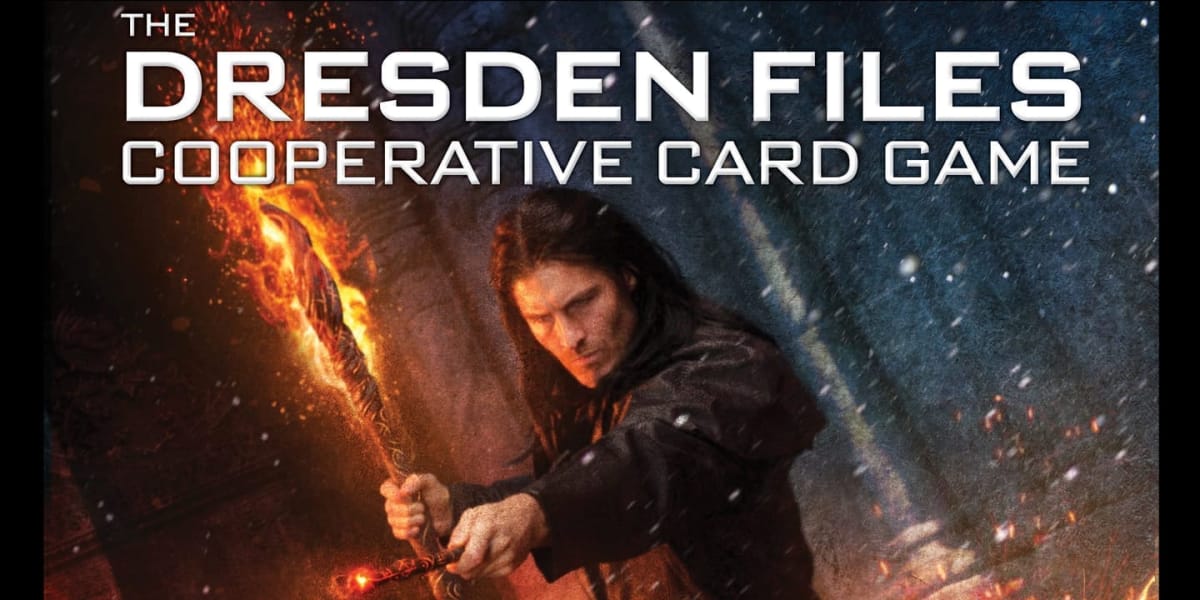Update: Evil Hat has posted a series of strategy articles for The Dresden Files Cooperative Card Game that are very handy, and improve the experience for people who might be struggling with the difficulty of the game.
The Dresden Files is a campy, entertaining series of books about a wizard private detective who solves all manner of cases that deal with the supernatural. In the books (the ones I've read anyway) Harry Dresden often manages to come out on top with a combination of smarts, magic, friends, and luck. The Dresden Files universe has already been explorable via the Dresden Files RPG but, until now, there hasn't really been a way for people to dip their toe into the universe without dedicating the time it takes to actually play a pen and paper RPG.
Enter The Dresden Files Cooperative Card Game. Playable in about 30 minutes, this game attempts to insert players directly into the stories of the Dresden Files books as they play as Harry and his friends in an attempt to solve Cases, overcome Obstacles, take Advantages, and defeat Foes, and like many cooperative games, The Dresden Files Cooperative Card Game is hard. It's very hard. In fact, nearly every game that I've played has actually ended with a few die rolls at the end determining our fate (most often deciding that we are losers.) If that's not something that you are game for, then you are probably going to want to give this game a pass, because it happens a lot.
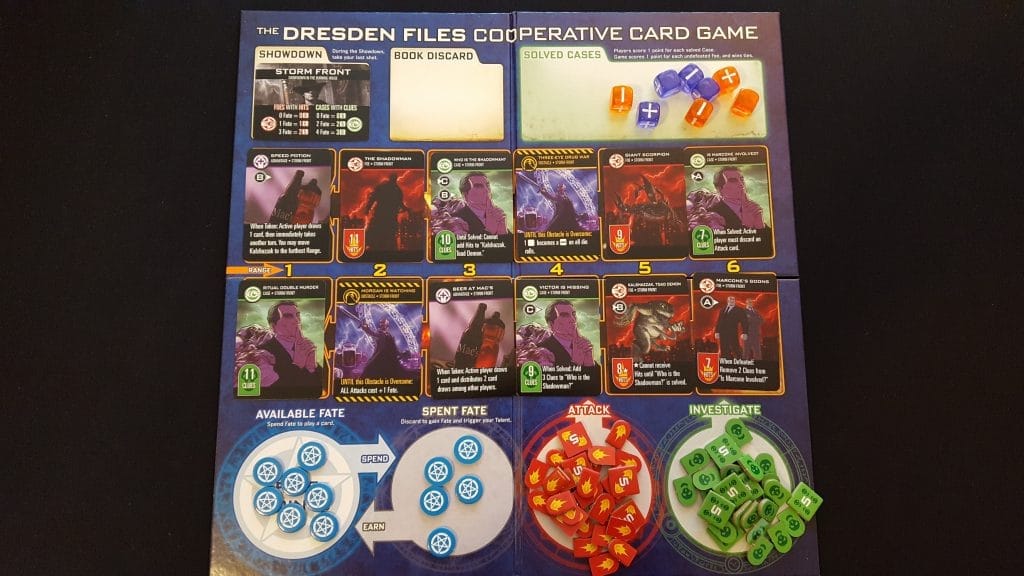
There are a huge number of variables that change from game to game here, not just in the number of different stories that you can play (including a system that lets you randomly generate a story to play) but inside of each individual story from each play to the next. First of all, the cards in each Book are randomly dealt onto the board and, baring a few rules about the placement of Obstacles and Advantages, the location of the cards can really determine just how difficult it will be for the players to win. The second big variable is in the player's cards. Each player only draws a few cards from their deck each game. There are a few ways to draw more but, more often than not, you have to make due with what you draw. That means that you can never be sure that you will be equipped to tackle all of the difficulties that you will face.
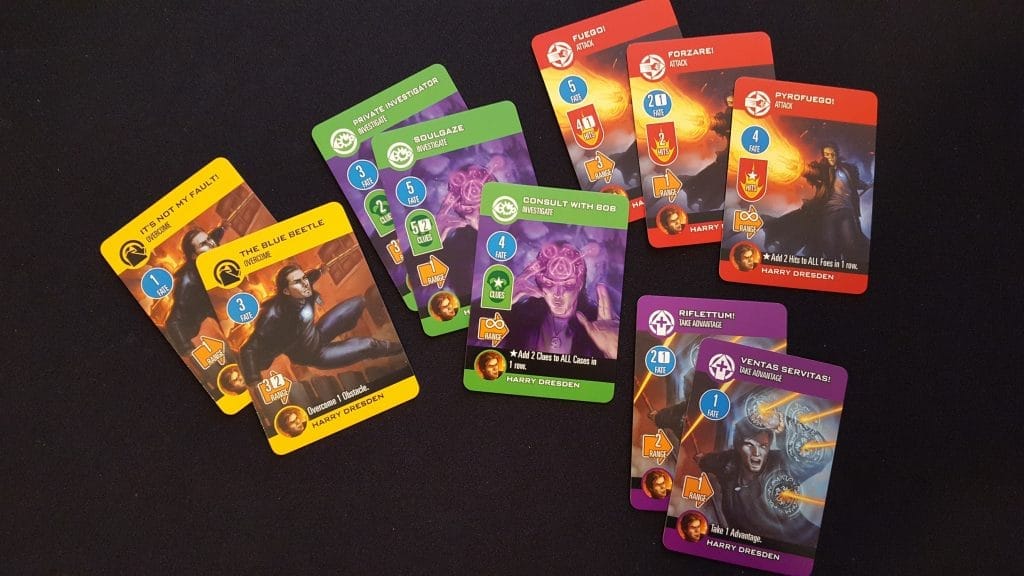
The player cards are split into a few categories; those that let you deal wounds to enemies, those that let you add Clues to Cases, cards that let you overcome Obstacles, and cards that let you take Advantages. Each of the cards has a range that determines exactly how deeply in each line it can reach and, based on the way the Book cards lay on the table, you can find yourself with very few actual options to take on your turn. For example: you might end up with a majority of Attack cards, but all of the enemies might be out of reach. Working together with your teammates can help mitigate those difficulties, but you are at the mercy of the cards you are dealt. Each card can be discarded to add Fate to the communal pool, which is spent to play cards, so even cards that appear 'unplayable' can still be useful, but it can happen where one player ends up being the Fate-bot for an entire game, without really getting to contribute anything tangible.
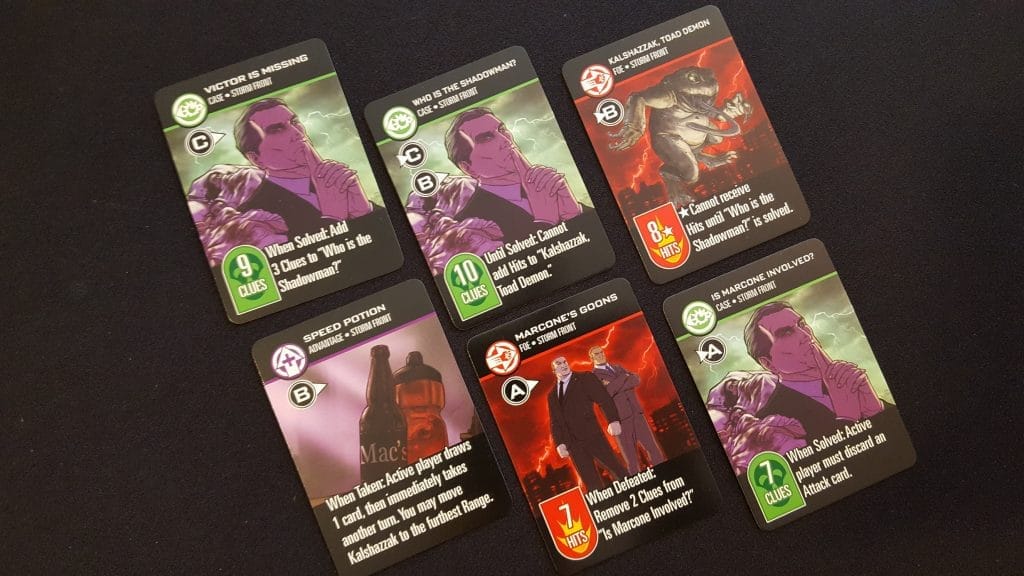
The one big upside of the amount of randomness in the setup is that the game gains a huge amount of replayability in the process. Like I said, even playing the same Book multiple times feels different because of the variance in the Book card setup and the cards that your player will see. You can also switch characters between plays, as long as Harry is in the mix, so that adds another layer of replayability as well. We found it fun to restrict ourselves only to the characters that are actually in each book the first time we played it, but we had fun bringing in other characters on subsequent attempts.
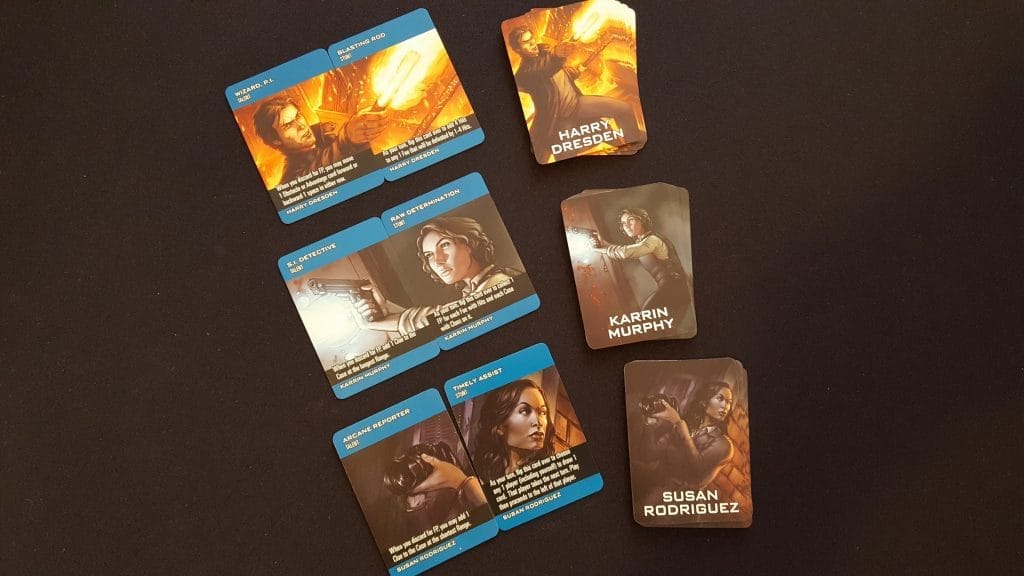
That brings me around to the theme. The thematic bits in this game really only work if you have actually read the books. There isn't enough story (well, there really isn't any story) in the game to bring players up to speed as to why certain cards effect each other in certain ways, or why the characters have the Stunts and Powers that they do, so players that don't know the lore behind the game are left with an almost entirely mechanical experience as they play. If you are familiar with the books then it's not hard to imagine how the mechanics have some connection to the way the stories play out. Harry often has limited resources, and he has to rely on his friends and on luck to see things through, but the end of the game is really going to determine whether you are going to want to give this game a try or not.
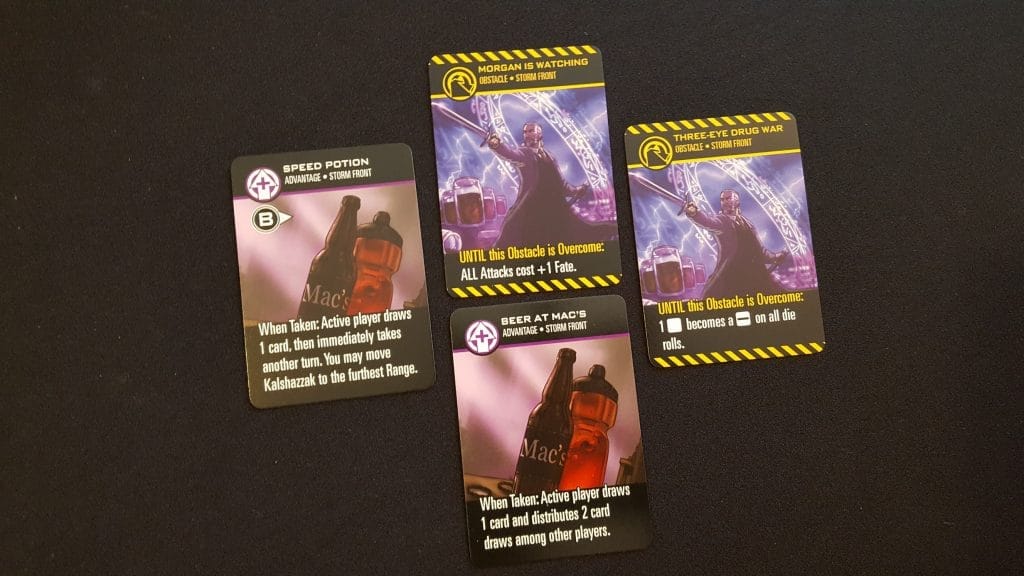
Most games last until the players run out of cards. In order to win, the players need to have solved more Cases than there are Foes left on the board. Once the players are out of cards, or have decided to end the game, the Showdown begins. Unless players have solved all of the Cases (which is extremely rare in my experience) the outcome of the game is going to be determined by die rolls in the Showdown. During the Showdown the players get a chance to roll the Fate dice in order to solve any unsolved Cases with clues on them, and defeat any remaining Foes that have taken Hits. If the players have any Fate points available they can skew the odds in their favor, but even when you do that you have to roll the dice. The dice have three possible outcomes; blank, which does nothing, + which adds one success, and - which removes one success. As long as you come out of the Showdown with enough Cases solved you win.
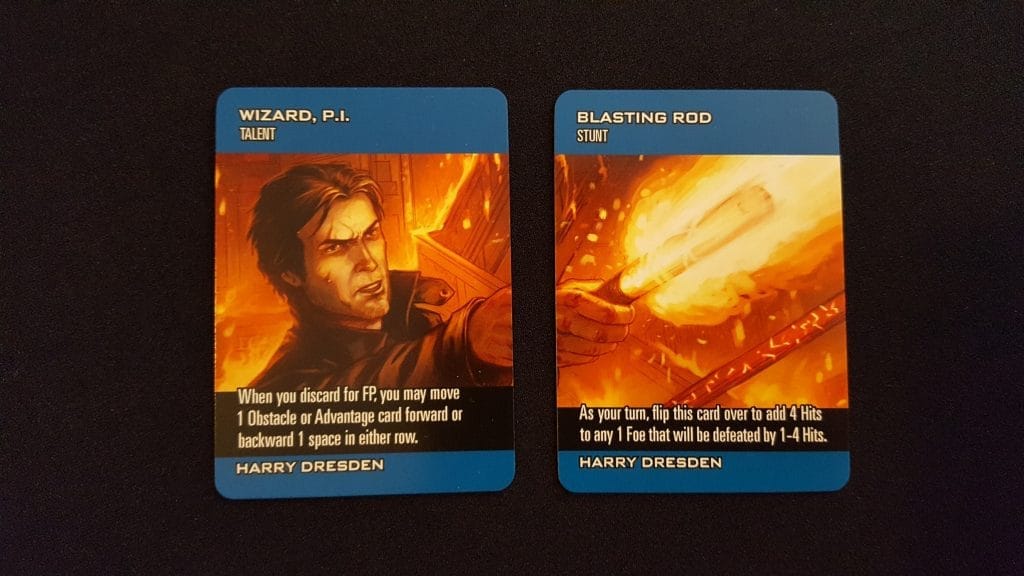
Due to the way the Showdown plays out, the players have to decide if they want to pile their Clues and Hits onto a few cards in order to get them out of the way early, or spread the love around and hope the dice are in their favor. If you go for the former route it can lead to an obvious victory, but it usually only works out if the book cards were in a favorable position from the start that paired well with the cards the players drew. More often, it makes sense to get a good mix of Clues and Hits spread around to different targets, and hope that the dice go your way. Like I said earlier, if you aren't okay with the outcome of your game riding on a few rolls of the dice then you aren't going to be okay with this game, as most games end that way. If you are good with that, especially if you are a fan of The Dresden Files universe, then there is a lot to like here, especially since the game sets up in a snap and plays out in 20 to 30 minutes.
A note on content: The core game comes with five Books and a small handful of characters. There is plenty of content on offer in just the core game, especially considering the random Side Jobs. There are three small expansions available as well that each add two more playable characters and two additional books. If you like this game then the expansions are must-haves. Even though each expansion is small, two more characters and two more books adds up to a ton of content.
A note on “chrome”: The Dresden Files Cooperative Card Game has good components overall, although some art is re-used on cards for each Book and character, such as the Advantages and Obstacles. All in all, the art is well done, and it fits the theme of the game very well. There isn't a huge amount of shuffling involved, so sleeving this game shouldn't be necessary in order to keep the cards nice. The rules are easy to learn, and the custom Fate dice are very nice.
The bottom line:
The Dresden Files Cooperative Card Game sits in a weird space. The core mechanics are solid, assuming you like games with a huge luck-factor, but you really need to know the stories from The Dresden Files books to make anything out of the theme. The game itself has almost zero theme if you haven't read the books, and so it's difficult to recommend this game to people who know nothing about the lore going in to the game. On the flip-side; if you know the books, and are familiar with the way things shake out in them, then the huge luck-factor and limited options make sense, and the game offers a huge amount of replayability both with the Books that are included and in the random Story generator. This game has been very difficult to score, because it really needs two scores; one for people who haven't/don't plan to read the books, and one for fans of the books. As it stands, I'm splitting the difference, so if you are a fan of the Dresden-verse you should add a point to a point and a half, depending on your level of fandom. Either way, many of the games end with a roll of the Fate dice determining whether you win or lose, so if you don't like games that hang on a die roll then this game is not going to be for you.
Get this game if:
You are a big fan of The Dresden Files
You like difficult cooperative games.
You enjoy high amounts of randomness in your games.
Avoid this game if:
You don't like games that are won and lost on a single roll of the dice.
You want a game where you feel in control.
You dislike games that you'll lose far more often than you'll win.
The copy of The Dresden Files Cooperative Card Game used for this review was provided by Evil Hat.
Review Summary
The Dresden Files Cooperative Card Game is a good time 'if'. If you like The Dresden files, and if you like difficult cooperative games, and if you don't mind winning or losing based on a roll of the dice there is quite a bit of fun to be had here. If you can't check all three of those boxes then this most likely isn't the game for you.
(Review Policy)Have a tip, or want to point out something we missed? Leave a Comment or e-mail us at tips@techraptor.net
